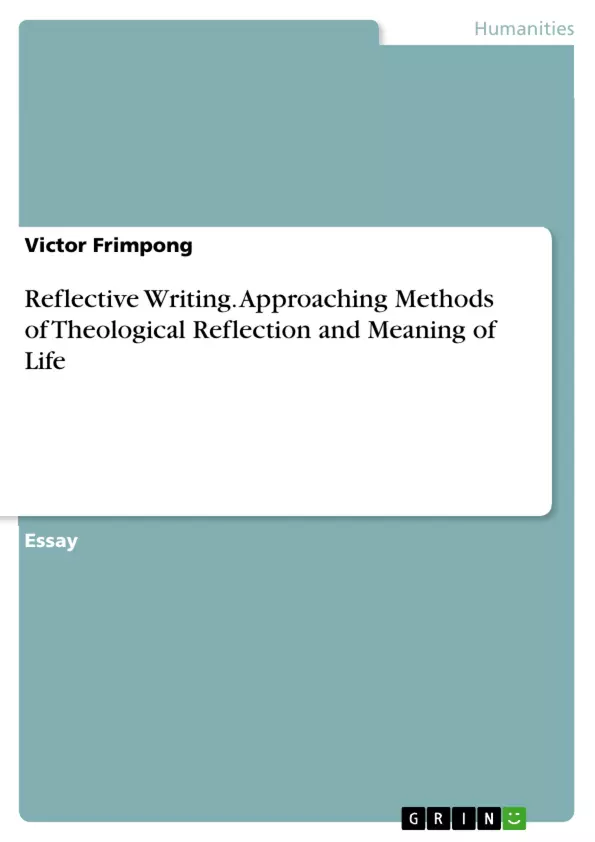This essay illustrates a trajectory of a reflective model using real-life individual experience and leading to action.
Reflective writings are well covered in academic and applied works of literature, even though reflection is a social construct subjected to varying interpretations, and no clear consensus on what, and how it should look like. The core meaning of reflection is occasionally contested, even belittled as mere individual self-dialogue. Popular commentary has wondered whether a mere recollection of event on a reflective format leads to any meanings at all. What we do know, is that reflection offers an opportunity to consider how one’s personal experiences and observations through critical thinking and acceptance of new ideas.
Inhaltsverzeichnis (Table of Contents)
- INTRODUCTION
- UNDERSTANDING THEOLOGICAL REFLECTION
- MODELS AND THEMES
- Method in Ministry
- Movement towards Insight
- INTEGRATING THEMES INTO EXPERIENCE
- LEARNING MEANING OF LIFE
- CONCLUSION
Zielsetzung und Themenschwerpunkte (Objectives and Key Themes)
This essay aims to provide a comprehensive understanding of theological reflection, exploring its definition, models, and themes, and ultimately demonstrating its practical application in personal experience and learning. It emphasizes the importance of reflective writing as a tool for deep thinking, personal growth, and action.
- The nature and essence of theological reflection.
- Models and themes that inform theological reflection.
- Integration of theological reflection into personal experiences.
- Learning from experience through theological reflection.
- The application of theological reflection in real-life situations.
Zusammenfassung der Kapitel (Chapter Summaries)
The introduction establishes the concept of reflection and its significance in personal growth. It highlights the challenges associated with defining and understanding reflection, acknowledging the diverse perspectives and interpretations surrounding it.
The chapter on "Understanding Theological Reflection" dives into the history and characteristics of this approach to theological inquiry. It discusses the contributions of prominent figures like Father Pedro Arrupe and Avery Dulles, emphasizing the role of personal experience and contemporary societal issues in shaping theological reflection.
The "Models and Themes" section explores specific models and themes within theological reflection, focusing on "Method in Ministry" and "Movement towards Insight." These sections likely delve into practical applications and approaches to incorporating theological reflection into various aspects of life.
The chapter titled "Integrating Themes into Experience" is expected to explore how the themes and insights gained through theological reflection can be integrated into personal experiences. This section likely provides concrete examples and strategies for applying these concepts in daily life.
The chapter on "Learning Meaning of Life" likely delves into the process of gaining meaning and understanding from life experiences through theological reflection. It may explore how reflection can contribute to personal growth, purpose discovery, and a deeper understanding of one's place in the world.
Schlüsselwörter (Keywords)
This text explores the concept of theological reflection, emphasizing its importance in personal learning and growth. Key themes include the nature and essence of theological reflection, models and themes within the field, integration of theological reflection into personal experiences, and the process of learning from experience through this approach. The essay is likely to highlight the role of personal reflection in finding meaning and purpose in life.
Frequently Asked Questions
What is theological reflection?
It is a method of considering personal experiences and observations through critical thinking to find deeper religious or spiritual meaning.
How can reflective writing lead to action?
By analyzing real-life experiences using reflective models, individuals can gain insights that directly inform their future choices and professional practice.
What is the "Method in Ministry" model?
It is a specific model within theological reflection used to integrate faith and practice in ministerial or service-oriented contexts.
Who are key figures in the history of theological reflection?
The essay mentions the contributions of prominent figures like Father Pedro Arrupe and Avery Dulles.
Can reflection help in finding the "meaning of life"?
Yes, the essay explores how the process of gaining meaning from life experiences is a core outcome of consistent theological reflection.
- Citar trabajo
- Victor Frimpong (Autor), 2020, Reflective Writing. Approaching Methods of Theological Reflection and Meaning of Life, Múnich, GRIN Verlag, https://www.grin.com/document/590657



